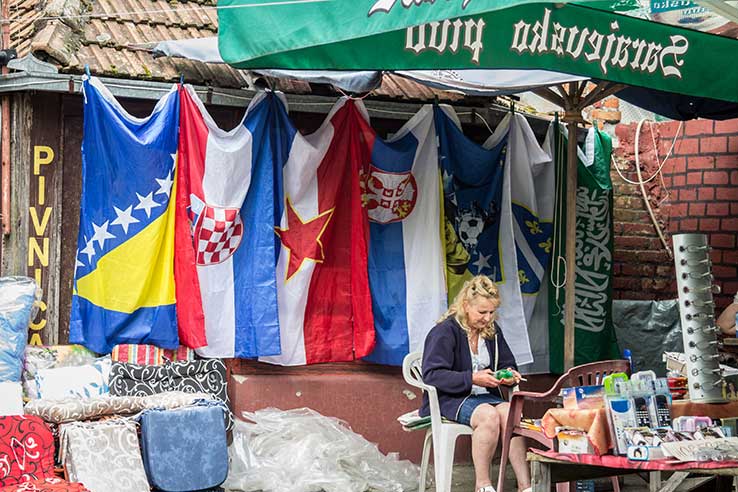Vladimir Djordjevic
 Nationalist agendas in the region need only a small spark to create a huge flame hard to control.
Nationalist agendas in the region need only a small spark to create a huge flame hard to control.
Being recently at a conference in Tutzing (in the Munich area) that was dedicated to Memory Cultures since 1945: German-Southeast European Entangled History, organized by Südosteuropa-Gesellschaft with the support of the Federal German Ministry of Foreign Affairs, both reminded and convinced me time and again that, as Faulkner himself wrote years ago, “the past is never dead. It is not even past.” These lines do not only reflect Faulkner’s belief that what happened in the past is very much alive and well (and hence inherently part of our present), mainly in the sense that it is/may be recreated and recontextualized to fit the present moment, but also that there is an absolute need to face that what happened to try to understand and ‘process’ it.
Think of the post-Yugoslav space for a moment: there is, I dare to say, more than a dozen competing narratives of not only the recent past (as in what took place in the 1990s during the breakup of the common Yugoslav state), but equal, if not more, narratives on the more distant past, that is on the First and the Second World Wars and the respective role of the ethnic groups that then went to create the joint Yugoslav state. These different and ultimately competing narratives prove to be a significant roadblock for a common and shared vision of the future that would build bridges of understanding in the region. To argue my case, I will use the example of Bosnia-Herzegovina, highlighting how both more distant and relatively recent past are abused in the domestic political life where aims of day-to-day politics, unfortunately, remain more important than the future of the common state.
“Ethnicizied Reality” of Bosnia and Herzegovina
Bosnia-Herzegovina, whose EU future remains uncertain and whose prospects of moving past the “ethnicized reality” seem to be vague, continues to be the state in which belonging to three different ethnic groups has become the underlying principle, the ‘alpha and omega’ if you like, of the domestic political life. Established at the end of 1995 within the Dayton framework, the country was supposed to allow the then three warring parties to come to terms with each other, with the international community at that time hoping that, as time goes by, a common political and societal narrative would be established and a shared vision of "our", instead of "your" and "my" future, be reached. Soon the 30th anniversary of the Dayton system will be celebrated, but the future of the post-Yugoslav republic of BiH that is ethnically divided remains in question. Powerful domestic political forces questioning the common BiH framework, the likes of Milorad Dodik of Republika Srpska, only prove this point.
“Bosnian Serb walkout from state institutions in July, and renewed threats from the Bosnian Serb leadership to move forward with the separation of the Serb-dominated entity of Republika Srpska from the rest of the country” indicate how deep the BiH crisis really is and how narratives on the common future are essentially dismissed by politicians abusing nationalist agendas towards their own goals. Dodik has been a master in this regard, dominating Republika Srpska's political scene for almost two decades now, often relying on the nationalist logic that has remained primarily inspired by the warring 1990s. A recent initiative dedicated to the main issues in the EU integrations of BiH highlights this issue. It underscores several problems that BiH has been facing since the Dayton Agreement, the biggest of them being that the past, primarily the one related to the conflicts in the 1990s, has remained unaddressed by the three ethnic groups.
 Source: shutterstock.com
Source: shutterstock.com
Hence, young generations of the ethnically divided camps are still taught competing narratives that highlight the blame of other (two) ethnic groups rather than addressing responsibility and involvement of one's ethnic group in the conflicts in the 1990s. Politicians have their part in this: by constantly toying with the narratives that ultimately shift the blame to the other ethnic groups for their engagement in the decade that saw the destruction of socialist Yugoslavia, they persistently undermine the future of the country for the sake of their own (short-term and usually corruption-ridden) goals. This situation is ironic (and alarming), especially when considering that nationalist politicians would be left jobless had they not had the BiH state to take their regular jabs at.
The country plagued by ethnic divisions proves that “quarreling over the past is no way to build the future”, making the BiH case an actual test for the future of the EU integration of the Western Balkans. If any meaning is left in the said integration of the region and if any proper plan of the EU to accept the Western Balkans does exist (and I honestly have my doubts over this), then BiH must inevitably be one of the focal points in the integration process. It seems utterly impossible to think of the EU integration of the region without this country, the state whose ethnic diversity reflects the very complexity of the societies in the region and whose political survival would show the European will to help Bosniaks, Croats, and Serbs can indeed work together towards overcoming the legacy of the recent conflicts.
At this point, and I am afraid this will remain so in the years to come, it is difficult to move away from the ethnicized reality of the country, where the three ethnic groups, largely Bosnian Serbs and Croats, continue to question the legitimacy of the BiH state solution. The way this legitimacy is challenged is what worries me the most: the BiH state solution is refused as unjust and politically illegitimate chiefly not from the contemporary context but mostly, and this is the nonsensical part about it, from the historical point of view. The questions on who owns and who has the right to 'own' and 'claim' this country constantly pop up, leading to unnecessary and often pointless narratives that abuse historical facts.
Once topics such as the Srebrenica genocide (that is, btw, not considered genocide and refused as such in the Republika Srpska), war crimes committed in the 1990s and responsibility for them, war criminals that escaped justice and were never convicted for their role in the said conflicts, Bosniak Muslim identity, and many more enter the debate, nationalists start winning hearts rather than minds of their electorate, being highly vocal in supposedly defending the interests of that very electorate (read: primarily their ethnic group). In this completely unfortunate venture, they are aided by the educational system that does nothing to help and fight the “ethnicized reality” of the country. This system continues to provide a venue for young generations to discuss the guilt of others and to learn about blame-shifting rather than anything else, preventing the young generations from understanding the role (and responsibility) of their ethnic camp history-wise.
A Way Out?
One of the ways out of this ‘Balkan mess’ may be the recent appointment of a new High Representative (HR) for BiH, Christian Schmidt. “The Office of the High Representative (OHR) is an ad hoc international institution responsible for overseeing the implementation of civilian aspects of the Peace Agreement ending the war in Bosnia and Herzegovina.” Schmidt may help BiH move away from the ethnic-based reality, whereby the new HR should try and offer solutions for blunders in the country's domestic politics, partly perhaps drawing on the German experience of facing the horrors done by the Nazi regime in the Second World War.
Additionally, the EU would have to do its part and move past promising the region that it will be integrated into the EU one day. There seem to be no “firm timeline” in this regard, making the whole accession story a pipedream. It is impossible to solve the problems in BiH without Brussels offering the country (and the region) a clear perspective that would allow it to break away from the past, equipping it with enough tools to gradually come to terms with (as in understand) what happened in the 1990s (and beyond). These tools should primarily be based on the fact that in any post-conflict society, “peace and coming to terms with the past cannot happen under conditions of poor socioeconomic development, poverty, and inequality.”
Finally, both Serbia and Croatia (read: politicians in these countries) need to do more mature and assist BiH in being a stable state. Having politicians from both states acting childishly by engaging in nationalist discourses essentially to satisfy their electorate sends a wrong message to the region. It not only reminds the region that, as Faulkner said, the past is not past but shows that nationalist agendas in the region need a relatively small spark to produce a much bigger flare that then seems to be hard to control.
Once these flares burst into open flames, the nationalist agendas based on the collective memories of the past shifting the blame to others (with the other side/ethnic camp being the usual suspect and culprit) come back to life, risking peace in the region, making all of us wonder if we have at all made any progress towards peace.
Please refer to the Terms before commenting and republishing the content.
Note: The views and opinions expressed in this article are those of the author and do not necessarily reflect the views of the Institute of Communication Studies or the donor.


